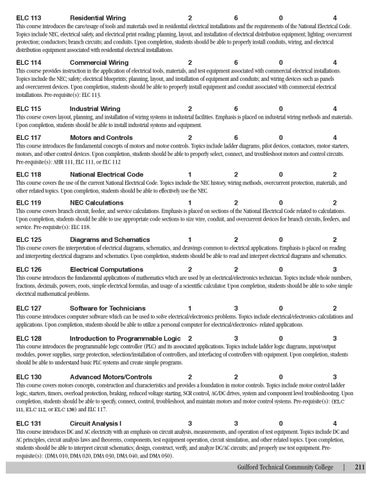ELC 113 Residential Wiring 2 6 0 4 This course introduces the care/usage of tools and materials used in residential electrical installations and the requirements of the National Electrical Code. Topics include NEC, electrical safety, and electrical print reading; planning, layout, and installation of electrical distribution equipment; lighting; overcurrent protection; conductors; branch circuits; and conduits. Upon completion, students should be able to properly install conduits, wiring, and electrical distribution equipment associated with residential electrical installations. ELC 114 Commercial Wiring 2 6 0 4 This course provides instruction in the application of electrical tools, materials, and test equipment associated with commercial electrical installations. Topics include the NEC; safety; electrical blueprints; planning, layout, and installation of equipment and conduits; and wiring devices such as panels and overcurrent devices. Upon completion, students should be able to properly install equipment and conduit associated with commercial electrical installations. Pre-requisite(s): ELC 113. ELC 115 Industrial Wiring 2 6 0 4 This course covers layout, planning, and installation of wiring systems in industrial facilities. Emphasis is placed on industrial wiring methods and materials. Upon completion, students should be able to install industrial systems and equipment. ELC 117 Motors and Controls 2 6 0 4 This course introduces the fundamental concepts of motors and motor controls. Topics include ladder diagrams, pilot devices, contactors, motor starters, motors, and other control devices. Upon completion, students should be able to properly select, connect, and troubleshoot motors and control circuits. Pre-requisite(s): AHR 111, ELC 111, or ELC 112 ELC 118 National Electrical Code 1 2 0 2 This course covers the use of the current National Electrical Code. Topics include the NEC history, wiring methods, overcurrent protection, materials, and other related topics. Upon completion, students should be able to effectively use the NEC. ELC 119 NEC Calculations 1 2 0 2 This course covers branch circuit, feeder, and service calculations. Emphasis is placed on sections of the National Electrical Code related to calculations. Upon completion, students should be able to use appropriate code sections to size wire, conduit, and overcurrent devices for branch circuits, feeders, and service. Pre-requisite(s): ELC 118. ELC 125 Diagrams and Schematics 1 2 0 2 This course covers the interpretation of electrical diagrams, schematics, and drawings common to electrical applications. Emphasis is placed on reading and interpreting electrical diagrams and schematics. Upon completion, students should be able to read and interpret electrical diagrams and schematics. ELC 126 Electrical Computations 2 2 0 3 This course introduces the fundamental applications of mathematics which are used by an electrical/electronics technician. Topics include whole numbers, fractions, decimals, powers, roots, simple electrical formulas, and usage of a scientific calculator. Upon completion, students should be able to solve simple electrical mathematical problems. ELC 127 Software for Technicians 1 3 0 2 This course introduces computer software which can be used to solve electrical/electronics problems. Topics include electrical/electronics calculations and applications. Upon completion, students should be able to utilize a personal computer for electrical/electronics- related applications. ELC 128 Introduction to Programmable Logic 2 3 0 3 This course introduces the programmable logic controller (PLC) and its associated applications. Topics include ladder logic diagrams, input/output modules, power supplies, surge protection, selection/installation of controllers, and interfacing of controllers with equipment. Upon completion, students should be able to understand basic PLC systems and create simple programs. ELC 130 Advanced Motors/Controls 2 2 0 3 This course covers motors concepts, construction and characteristics and provides a foundation in motor controls. Topics include motor control ladder logic, starters, timers, overload protection, braking, reduced voltage starting, SCR control, AC/DC drives, system and component level troubleshooting. Upon completion, students should be able to specify, connect, control, troubleshoot, and maintain motors and motor control systems. Pre-requisite(s): (ELC 111, ELC 112, or ELC 138) and ELC 117. ELC 131 Circuit Analysis I 3 3 0 4 This course introduces DC and AC electricity with an emphasis on circuit analysis, measurements, and operation of test equipment. Topics include DC and AC principles, circuit analysis laws and theorems, components, test equipment operation, circuit simulation, and other related topics. Upon completion, students should be able to interpret circuit schematics; design, construct, verify, and analyze DC/AC circuits; and properly use test equipment. Prerequisite(s): (DMA 010, DMA 020, DMA 030, DMA 040, and DMA 050).
Guilford Technical Community College
|
211
